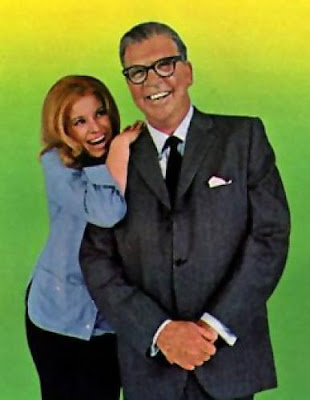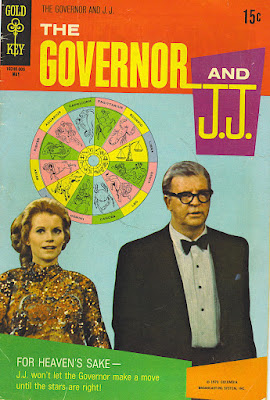A few years ago I read an article entitled “The Politicization of Everything.” It expressed regret at how every aspect of our lives now seems to have a political component that wasn’t there in previous generations – media, movies, sports, technology – and how this infestation has widened our current polarization.
It’s not a coincidence that the post-Comfort TV era of television has offered many more shows revolving around politics, from Spin City and The West Wing to Veep and Madame Secretary. But from the 1950s through the 1980s how government worked (or didn’t work) was not as popular a topic for a network series. The Senator (1970) was excellent but short-lived; Benson featured James Noble as a governor who was more caricature than character. Hizzoner (1979) was impeached after seven episodes, as was Hail to the Chief (1985), in which Patty Duke played the first woman president.
Compared to those efforts, The Governor and J.J. (1970-1972) seems like a hit, lasting 39 episodes and even inspiring its own comic book. It was highly regarded by the Hollywood Foreign Press, who bestowed it with Golden Globes for Best Comedy Series, Best Actor in a Comedy/Musical Series (Dan Dailey) and Best Actress in a Comedy/Musical TV series (Julie Sommars). Maybe they saw something that American audiences didn’t – or maybe the CBS check cleared in time for that corrupt electorate to make their selection.
Either way, most viewers did not share their enthusiasm, so the show is not remembered as a success, by those who remember it at all.
Why didn’t it work? Bad luck, bad time slot, bad karma – or maybe, as I suspect, it had some of the elements necessary to make a sophisticated sitcom work, but fell short in others, one being a more developed supporting cast.
It’s a show I like almost entirely because of Dan Dailey, a veteran movie actor and song and dance man who was well-known to everybody back then but whose name would not be familiar to anyone under 40 anymore. He plays Bill Drinkwater, the widowed governor of an unnamed state in the midst of a re-election campaign.
Dailey has a relaxed, reassuring presence here. He comes across as a guy who just wants to do a good job, while humoring the pollsters and campaign advisers and image-makers who think the message is less important than how it is delivered, and how much production can be put behind it.
Campaign Adviser: “I want to make the voters hungry for you. How do I make you totally appetizing?”
Governor: “How about spreading me on crackers?”
His daughter J.J. (Jennifer Jo) serves as a first lady of sorts, accompanying him to campaign events and schmoozing with visiting dignitaries, while also pursuing her own interest in animals as assistant curator at a zoo. Father and daughter get along just fine, though sometimes he worries that her loyalty to him is getting in the way of her social life.
Rounding out the governor’s staff is secretary Maggie McLeod (Neva Patterson), press secretary George Callison (James T. Callahan), and housekeeper Sara Andrews (Nora Marlowe).
The series was created by Leonard Stern and Arne Sultan, two names familiar to anyone who watched Get Smart, another series with a political element. The approach is gentler here, however – we’re not laughing at bumbling bureaucrats, but instead wishing there were more decent, straightforward folks like Bill Drinkwater in government.
A few episodes are on YouTube and provide a good sampler of what the series was like. “A Day in the Life,” has the governor’s staff working on a 30-minute campaign ad; “Second Opinion” shows how every household, even the governor’s mansion, grinds to a halt when a beloved pet is sick.
While there were some political discussions that touched on contemporary issues, J.J.'s left-leaning views and her father’s conservatism were painted more in broad strokes, which means the series doesn’t come off as dated. Ironically, Julie Sommars was actively involved in real-world politics, but as a Republican. There were a couple of guest spots from actual governors during the run, which will not mean much to viewers now. Vermont’s Deane C. Davis brings Bill some maple syrup and invites him to go skiing.
When the program was canceled by CBS, it was replaced in its Wednesday time slot by To Rome with Love, which had moved from Tuesdays to make room for All in the Family. That series didn’t last either, which only goes to show that sometimes you replace a politician, and then realize later you’ve made a big mistake.




I remember this--vaguely. It sounds like it should've been up there in syndication with some other shows from that era... for crying out loud, it got its own gold key comic!! Thanks for the refresh 🙂!
ReplyDeleteWe have to start with a correction:
ReplyDeleteThe Governor and JJ debuted on September 23, 1969.
The final episode aired December 30, 1970.
Those dates are a kind of key to what happened to the series:
The Gov &JJ had been in the works for more than a year before production began - most likely before the '68 elections began to fall apart.
Back in those dear old days, politicians actually got along - even across party lines.
I still recall a stump speech Richard Nixon gave that year, referring to Hubert Humphrey thus:
" ... and I want to say about our friend on the other side - and he is a personal friend, despite our differences ..." (Emphases mine.)
That sort of thing was actually commonplace back then (and who ever thought that we'd actually miss Dick Nixon?).
I remember The Gov&JJ as being a friendly, funny show with likable people, which style was just starting to go out of fashion at that point.
By the way, one reason I'm able to pin down the dates here (IMDb helped, of course) is that one of the later episodes marked the final TV apparance by the great Edward Everett Horton, who wrapped the show just before his passing (at age 86) in September 1970; the show, titled "File Safe", aired posthumously the following month (it's not among the YouTube shows; I checked).
Anyway, politics were a lot less toxic in '69; that they were starting to go hotly wrong may have been a factor in CBS's deciding to bail on The Gov.
Thanks as always for the context and clarifications. And in case you were curious, your recent comment on my old Magic Mongo piece wasn't posted because I pulled down the very rude comment to which you were responding. Not even sure how that one got by me in the first place.
DeleteIn re Magic Mongo:
DeleteI kinda figured that was the reason, but thanx anyway for the clarification.
I gave up rudeness for Lent years ago; I'd love to see more of us follow suit.
Thank you Mike for your observations. This was also a short lived show I liked. As you said, politics was different then and shows like this were usually US the people Vs the "Politian" and not any specific political party. They were ALL crooked and WE were supposed to keep them honest. This was of course generational in the late 1960s and early 70s to court the "baby boomer" demographic where earlier it was more regional and economic (adults only could play).
Delete